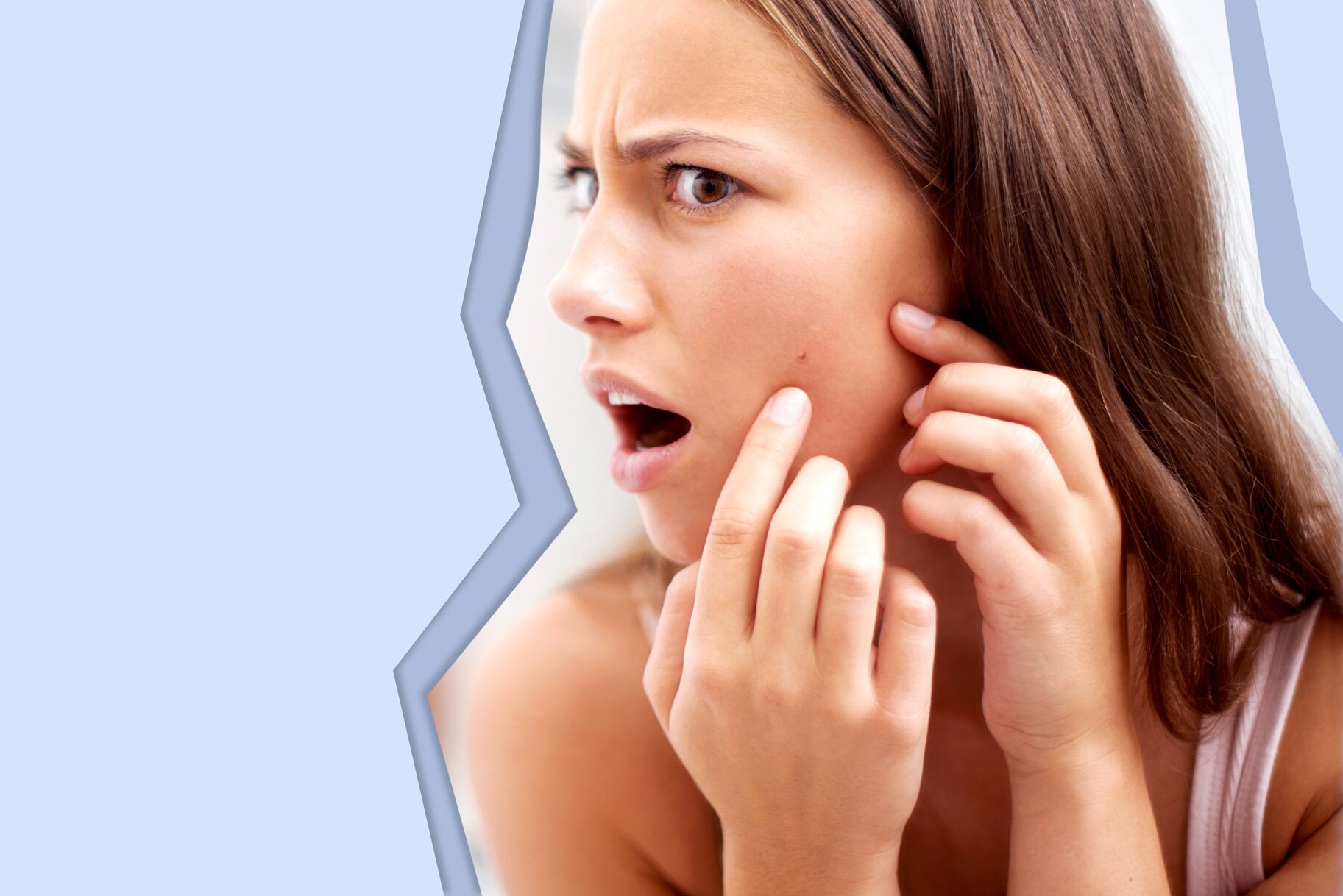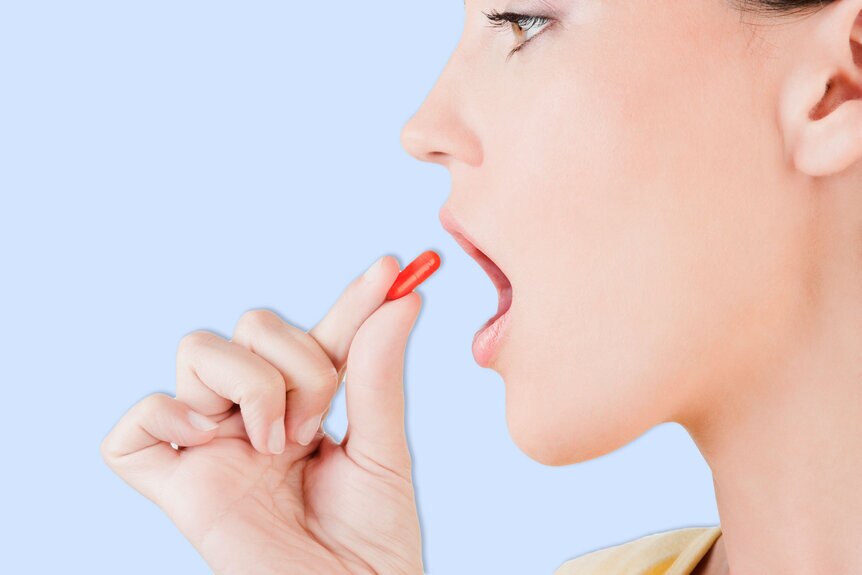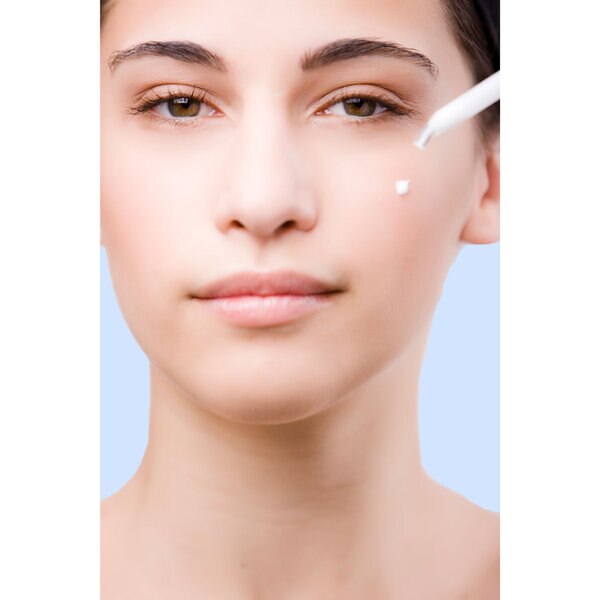Experts Reveal Underlying Acne Causes You Never Thought Of
Hit the road, P. Acnes.

You change your pillow sheets with the devoutness of a practicing nun, habitually wipe down your phone case with antibacterial wipes, and have masterfully broken the habit of touching your face (serious props for that one). Not to mention, all your pretty skincare products are lined up in a row, and you’d sooner delete your Instagram app than skip your morning and evening skincare regimen. So why the consistent sprouting of zits and whiteheads?
Turns out, there are a number of underlying issues to consider that may be adversely affecting your skin. From chronic stress to diet to hormone imbalance, we’re going deeper than that painful underground pimple to get to the bottom of your acne woes.
Anxiety and Stress
One of the biggest culprits for acne is stress and anxiety.
“Stress can take a significant toll on the skin, just like it can take a toll on the rest of your body,” Dr. Joyce Imahiyerobo-Ip, a board-certified dermatologist and consultant for HydroPeptide, told The Lookbook. “When you are stressed, the skin becomes more reactive, which means that any underlying skin conditions are more likely to flare up.”
She explained the stress hormone, cortisol, causes oil glands to go into overdrive. Increased oil production can lead to more acne on both naturally oily and dry skin, and is exacerbated by poor hygiene, bad products, and, of course, persistent stress.
On that note, be good to yourself. Keep organized, say "no" to a few things, and remember to treat yourself — whatever that means to you.
Your Diet
No matter what time of year it is, one sad fact remains the same: some foods can lead to breakouts.
“Certain foods can cause a spike in blood sugar, which then signals to our bodies to secrete insulin to manage blood sugar levels. The thing is, insulin can be inflammatory, which is connected to acne,” explained nutritionist Jillian Tuchman at Care/of. “The trick, then, is to eat foods that will cause a controlled blood sugar rise, rather than a spike.”
You don’t have to nix the sweet stuff altogether, but do eat them in moderation and pair them with fiber, fat, and protein to reduce the blood sugar increase, said Tuchman. For example, eating an apple with almond butter, which has fiber, fat and protein, will have less of an impact on your blood sugar than a glass of apple juice, which can cause an unmitigated spike in your blood sugar levels.
Processed foods also wreak havoc on your skin. “Avoiding foods that are highly processed is always a good idea, and especially so if your goal is clear skin,” Tuchman noted. “If you indulge in carbs or processed foods, help control your blood sugar rise by [also] pairing it with protein, fat, and fiber." For example, if you're chowing down on a bagel, throw some avocado or smoked salmon on top for a bit of protein and fat.
Ultimately, every person reacts differently to potentially inflammatory foods, so your mileage may vary. The best thing you can do is keep a food diary to keep track of how your skin reacts to different foods. This will help you learn more about what triggers inflammation for you and keep it under control.
New Medication
If you noticed an uptick in breakouts following a new medication, your Rx may be the culprit. Dr. Imahiyerobo-Ip explained that some medications can worsen acne, or cause acne-like rashes, on your face and body.
“Some examples include certain psychiatric medications like lithium, which can be used to treat bipolar disorder, [and] hormonal based medications can also contribute to acne. With an increasing number of women undergoing fertility treatments, this can be a great concern. The hormones some fertility medications can cause or worsen acne,” said Dr. Imahiyerobo-Ip.
Additionally, some steroid-based medications — including prednisone or anabolic steroids used by some athletes — can cause acne. “If you think that your medications are worsening your acne, please speak to your prescribing physician first. It can be extremely dangerous to stop a medication without physician guidance. Work with your doctors to find alternatives that may be better for your skin,” she advised.
Hormone Imbalance
Hormonal imbalances are absolutely linked to acne, and there are a number of ways your levels can get off kilter. Those are not limited to: new medication (mentioned above), age, your monthly cycle, meat and dairy products high in hormones, and certain medical conditions.
“Hormonal acne has a specific clinical pattern, with more painful acne cysts forming around the mouth. Hormonal acne affects women most commonly, particularly women in the late 30s and 40s. Our hormone levels change as we age. In the 30s and 40s subtle changes in the balance between estrogen and testosterone can results in hormonal acne,” explained Dr. Imahiyerobo-Ip. “Also, certain medical conditions — like polycystic ovarian syndrome — can cause severe hormonal acne in younger women.”
If you suspect that you have hormonal acne, schedule an appointment with a dermatologist to help come up with a game plan. Sometimes this can involve simple topical medications, or sometime hormonal therapies like birth control or a medication called spironolactone.
That Popular Skincare Product
Just because a product gets awesome reviews by friends and internet strangers doesn’t mean it will necessarily work for you. Skincare ultimately boils down to what works for you, and even that can change over the course of years, months, or even days (relating to your cycle). This is especially true if you have sensitive skin or a long history of acne.
“Acne prone skin requires a delicate balance in terms of skin care products. If your skin is too dry, your oil glands will pump out oil and this will cause acne. If you use products that are too occlusive, like ointments or coconut oil, your pores will become clogged and this will cause white heads and black heads,” said Dr. Imahiyerobo-Ip.
She said that common mistakes people with acne-prone skin make are not moisturizing enough, and an overly-aggressive routine, which can include over washing, excessive scrubbing, and applying spot treatment on non-affected areas. Always follow product directions, adhere to the advice of your dermatologist, and don’t use a product that’s causing you trouble — no matter how Instagrammable the packaging may be, and no matter how many five-star reviews it has on Sephora.
“My general philosophy is less is more,” said Dr. Imahiyerobo-Ip. “A simple skincare routine with proven ingredients is always best. In general, I recommend simple, gentle cleansers. If you have mild acne, a serum containing salicylic acid and azelaic acid will be very helpful. One of my favorites is Hydropeptide’s Redefining Serum for mild-comedonal acne (whiteheads and blackheads). If you have mild inflammatory acne, a product containing 2% benzoyl peroxide will be helpful.”
If you’re dealing with severe or hormonal acne, see your dermatologist stat. Every single person who’s put it off always wonders why they didn’t go sooner! And finally, maintain those good habits of not picking, and washing everything that touches your face on a regular basis.





